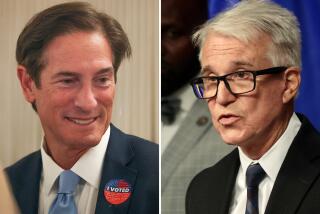Henry in Key Judicial Race : Judgment in Korean grocer case raises doubts about incumbent
- Share via
It’s true that judges must interpret the law independent of political pressure. But the widespread concern about controversial Superior Court Judge Joyce A. Karlin springs not from any quarrel about legal ideology--but from worries about her ability to apply the law fairly in individual cases.
A trial judge works “close to the ground”; his or her mandate is to use the considerable legal discretion he or she has to balance community interests with those of the individuals who appear before the court. The state Constitution permits lawyers to oppose sitting superior court judges, in part, to ensure that judges do so, that they stay close to community norms in their exercise of judicial discretion.
Concerns about Joyce Karlin’s fairness have prompted three lawyers to oppose her in Tuesday’s election. But only one of them is qualified for the job.
The Los Angeles County Bar Assn., which rates candidates for all contested local judicial races, has judged two of Karlin’s opponents “not qualified.” Karlin and Bob Henry received “qualified” ratings, meaning that the bar association believes each will perform “the judicial function satisfactorily.”
Given the size and stature of the Los Angeles legal community, we are saddened that no one running is more strongly endorsed by his or her peers. With only that reservation, however, we endorse Bob Henry for judge of the Superior Court, Office No. 17.
Joyce Karlin was appointed to the bench last year by Gov. Wilson. She won high praise as a prosecutor during the 15 years she spent in the U.S. Attorney’s office in Los Angeles. But her stunningly inapt sentence of Soon Ja Du, a Korean-born grocer, to probation with no jail time for the shooting death of Latasha Harlins, an African-American teen-ager, reflects a lack of fairness impairing her ability to sit as an impartial judge.
Deputy Atty. Gen. Bob Henry, a Harvard Law graduate, has spent his entire legal career in the California attorney general’s office. His work has focused on death-penalty appeals but, if elected, he would serve as a trial judge. He would have much to learn. But he gives every indication that he will work hard to do so. The Times endorses him.
More to Read
Sign up for Essential California
The most important California stories and recommendations in your inbox every morning.
You may occasionally receive promotional content from the Los Angeles Times.













